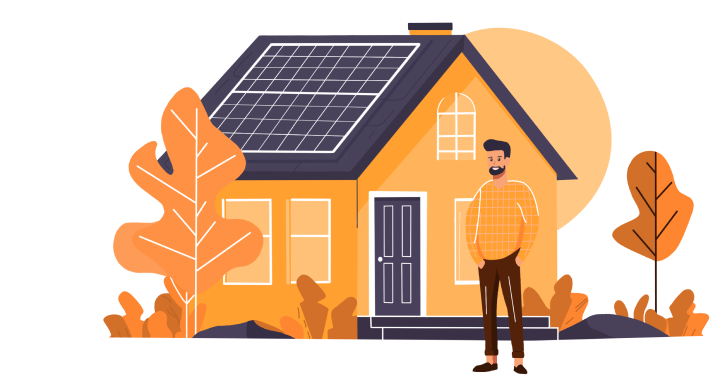we believe in the power of solar energy to transform homes and communities. Our mission is to make the transition to sustainable energy solutions easy, affordable, and accessible for homeowners like you.
Enter basic information to connect with solar providers in your area
Review your quotes to find the right match for your needs
See how much you can save with solar
Slash electricity bills with free, renewable energy.
Reduce emissions, improve air quality, and protect the planet.
Take control of your energy future with solar power.
Enjoy hassle-free energy production with minimal upkeep.
Increase property value and enjoy solid returns over time.
Access government incentives for affordable solar solutions.


Ready to make the switch to solar? Simply fill put in your Zip Code and fill out our easy-to-use form, and we'll provide you with a personalized quote tailored to your home's energy needs and budget.


How do solar panels work?
You might remember learning the first law of thermodynamics back in science class. To keep it simple, it just means that one kind of energy can be transformed into another.
When it comes to solar photovoltaic installation, energy from the sunlight gets collected and converted by the panel's PV cells. The converted energy then flows through the internal system, powering your home with an electrical charge.
How much do solar panels cost?
The cost of solar panel installation would vary from household to household, and this would all depend on factors like system size, typical energy expenditure, and attachments. That's why, at Solar Energy Host, we compile quotes from different providers so you'll know what price to expect.
But generally, a larger and more expensive setup could match your current power consumption with some room to spare. This way, you can generate your own energy and unplug yourself from the local grid.
On the other hand, you could opt for a smaller and more affordable system, supplementing what you get from the grid. With this option, you also get a backup plan when traditional electricity companies have power fluctuations, especially during high-heat seasons.
As for additional hardware, there are also optional batteries that contribute to the cost. If you have the budget, you can use this storage to keep the energy you generate and use it on less sunny days.
What are the financial benefits of going solar?
Think of the initial home solar installation cost as an investment that'll empower you down the line. For one, since you'll be the one supplying energy to your home, you could lower or completely do away with your monthly electricity bill. With continuous savings, your energy system could pay for itself in no time.
On top of that, you could add to your property's value. If you plan to sell your house, solar power could make the offer more appealing to buyers from the same savings standpoint. You can also tap into a wider market demographic, with more and more people shifting to environmentally sustainable living.
In a number of states and locations, there are even incentives that let you cut down on the total taxes you have to pay. Just keep in mind that percentages may differ per solar energy system and even the local government you're under.
Are there government incentives available for solar installation?
Installing solar panels can make you eligible for incentives like the Investment Tax Credit (ITC) and Solar Renewable Energy Certificates (SRECs). You can also try net metering programs to receive credit from your setup.
For recently installed solar energy systems, you could get an ITC that can be deducted from your quarter-year or annual tax payment. Just remember that the credit amount will typically vary depending on when you installed your qualified system.
To add to this, you can also get one SREC for every megawatt-hour (MWh) or 1,000-kilowatt-hour (kWh) of electricity generated by your home's solar setup. With the government enforcing renewable portfolio standards (RPS), utilities buy your certificates to satisfy state requirements.
Net metering programs let you sell any excess solar electricity. On brighter days, when your system generates more energy, you can transfer what you don't use to your utility company, and they'll use it on the local grid. You'll only be billed for the "net" amount of energy you consume.
How long do solar panels last?
You can think long-term with a solar installation, as panels usually last around 25 to 30 years.
Practice routine maintenance to ensure that your solar panels last a long time. This includes bi-annual cleaning to get rid of debris blocking the panel. As a consideration, you could also set up yearly inspections, where professional methods like thermal imaging sort out hot cell hotspots and more.
In addition, providers also typically give you two types of warranties: product and power.
This covers the materials used in the solar energy system, ensuring the quality and durability of the panels. It protects against factory defects, structural or mechanical issues, and general malfunctions. The average length of this warranty is around ten years, but some may even offer more than double that duration.
With most technology, performance decreases as the years go by. This is why solar panels also come with a power warranty, which often lasts longer, around 25 to 30 years.
It helps make sure the natural degradation happens slowly – generally no more than 2 to 3 percent during the first year you have your system up. Then, you can usually expect no more than 0.5 percent every year after.
So, if you keep your solar panels for 25 to 30 years, you'll ideally still have up to 85 percent performance efficiency.
What size solar system do I need for my home?
Most households' typical energy consumption per month can be covered by around 20 solar panels. Each panel is approximately 17.55 square feet in size, so a total of 351 square feet of roof space is required to install solar panels.
However, you should also take note that not all solar panels are the same. Polycrystalline options generally take up more space but serve as a happy medium, given budget and performance. On the other hand, monocrystalline options can cost more, but with their higher efficiency, they're usually ideal for smaller roofs and homes with demanding power requirements.
Will solar panels work in my location?
Not everyone lives in sunny states like Nevada, California, and Florida, but that doesn't mean solar panels won't work in your location. If you're in a colder and cloudier area, you could still enjoy the perks of this renewable energy through tilt frames.
In addition to this, depending on seasonal patterns and weather conditions, you can also tweak the horizontal angle of your solar panels. During winter, the tilt should match your latitude plus 15 degrees. In contrast, it's your latitude minus 15 degrees when it's summertime.
Now, for those with many obstructions around their place, such as electrical posts and tree branches, your provider might also recommend a ground mount in your backyard or another viable location.
With adjustability and versatility taken care of, you can ask, "Are there solar energy installers near me?" here at Solar Energy Host. We'll provide you with quick quotes from a number of reputable providers in your area.
How does solar energy benefit the environment?
Solar installations and setups bring electricity bill savings, but beyond that, sustainable power helps reduce our carbon footprint.
Sunlight is a renewable natural resource. Aside from that, when we generate electricity through a solar energy system, air pollution and greenhouse gasses aren't produced.
On the other hand, non-renewable energy, like fossil fuels, which we still use to generate electricity around the world, isn't as eco-friendly. To gain power from this resource, we'd have to ignite it to make energy. In the process, we produce carbon emissions as a byproduct. Making matters worse, we'll also have to wait millions of years for fossil fuels to form, making them a less sustainable resource.
What is the installation process like?
Have you made the decision to switch to solar energy? Great! First, get competitive quotes from different providers at Solar Energy Host, and then you can pick the most suitable offer based on possible savings and your budget. After that, we'll connect you with your chosen provider, and you can generally push through with these three steps:
Do I need to replace my roof before installing solar panels?
While a lot of panels look sleek, they still generally have some weight to them. Before the installation, check the age and condition of your roof. If your roof is older or has been compromised, structural repairs or a full replacement should be considered.
Remember, whether it's a slanted or a flat roof solar installation, an older foundation may not have the proper condition or support needed to hold solar technology–especially if you're thinking about getting a system with a battery.
Join the millions of homeowners who have already made to switch to solar

Switching to solar energy can seem daunting at first, but Solar Energy Host is here to simplify it with clear, easy-to-understand information and reliable help. We facilitate the easy search for reliable providers and professional advice, which makes the move to solar power smooth and straightforward.
At Solar Energy Host, we bring together quotes from several local providers, based on your electricity consumption requirements, special preferences, location and more. That's why you won't have to keep searching for terms like "How Do You Install Solar Panels On Roof," "Solar Electrical Installation" or "Solar Panel Installation Pensacola Fl" anymore-we help make your switch to solar as effortless as possible.
Just provide us with standard details like your location, average electricity bill and contact information to start getting quotes from local providers. Skip the search for "Commercial Solar Installation," "Solar Panel Installation" and "Cost Of Installing Solar Panels" and find out how much you can save with a free cost estimate from Solar Energy Host!